Timeline of the 2010 Atlantic hurricane season

The 2010 Atlantic hurricane season was one of the most active Atlantic hurricane seasons since records began in 1851 in which nineteen named storms formed.[1][nb 1] The season officially began on June 1 (with Hurricane Alex, the first hurricane of the season forming on June 15) and ended on November 30, dates that conventionally delimit the period of each year when most tropical cyclones develop in the Atlantic basin.[3] The season's final storm, Hurricane Tomas, dissipated on November 7.
The season produced twenty-one tropical cyclones, of which nineteen strengthened into tropical storms; twelve became hurricanes, and five further intensified into major hurricanes.[nb 2] The two most significant storms of the season, in terms of damage and loss of life, were hurricanes Igor and Tomas. Igor was one of the largest storms by gale diameter on record, and one that attained maximum sustained winds of 155 mph (250 km/h) before striking Newfoundland as a much weaker storm several days later. Tomas was a late-season tropical cyclone that rapidly intensified to reach maximum sustained winds of 100 mph (160 km/h) as it entered the eastern Caribbean Sea. Though the system did not make landfall, it severely affected the Greater Antilles, and impacted the southeastern Bahamas as a tropical storm before quickly moving into the open Atlantic.
This timeline includes information that was not operationally released, meaning that data from post-storm reviews by the National Hurricane Center, such as a storm that was not operationally warned upon, has been included. This timeline documents tropical cyclone formations, strengthening, weakening, landfalls, extratropical transitions, and dissipations during the season.
Timeline of events

June
- June 1
- The 2010 Atlantic hurricane season officially begins.[3]
- June 25
- 1800 UTC (2:00 p.m. EDT) – Tropical Depression One develops from an area of low pressure roughly 80 mi (130 km)[nb 3] north-northeast of Puerto Lempira.[6]
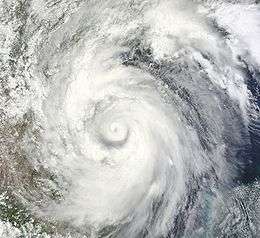
- June 26
- 0600 UTC (2:00 a.m. EDT) – Tropical Depression One intensifies into Tropical Storm Alex.[6]
- June 27
- 0000 UTC (7:00 p.m. CDT June 26) – Tropical Storm Alex makes its first landfall near Belize City with winds of 65 mph (100 km/h).[6]
- June 30
- 0000 UTC (7:00 p.m. CDT June 29) – Tropical Storm Alex intensifies into a Category 1 hurricane on the Saffir–Simpson hurricane scale, becoming the first of the 2010 season.[6]
July
- July 1
- 0000 UTC (7:00 p.m. CDT June 30) – Hurricane Alex intensifies into a Category 2 hurricane.[6]
- 0200 UTC (9:00 p.m. CDT June 30) – Hurricane Alex attains its peak intensity with maximum sustained winds of 110 mph (175 km/h) and a minimum barometric pressure of 946 mb (hPa; 27.94 inHg), and simultaneously makes a second and final landfall near Soto la Marina.[6]
- 0600 UTC (1:00 a.m. CDT) – Hurricane Alex weakens to a Category 1 hurricane.[6]
- 1200 UTC (7:00 a.m. CDT) – Hurricane Alex weakens to a tropical storm.[6]
- July 2
- 0000 UTC (7:00 p.m. CDT July 1) – Tropical Storm Alex weakens to a tropical depression.[6]
- 0600 UTC (1:00 a.m. CDT) – Tropical Depression Alex dissipates over the high terrain of central Mexico.[6]
- July 8
- 0000 UTC (7:00 p.m. CDT July 7) – Tropical Depression Two develops from an area of low pressure roughly 250 mi (400 km) southeast of Brownsville, Texas, and simultaneously attains its peak intensity with maximum sustained winds of 35 mph (55 km/h) and a minimum barometric pressure of 1005 mb (hPa; 29.68 inHg).[7]
- 1400 UTC (9:00 a.m. CDT) – Tropical Depression Two makes landfall on South Padre Island, Texas, with winds of 35 mph (55 km/h).[7]
- July 9
- 0600 UTC (1:00 a.m. CDT) – Tropical Depression Two degenerates into a non-convective remnant area of low pressure over northern Mexico.[7]
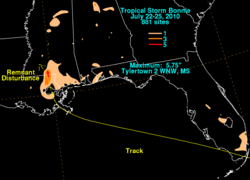
- July 22
- 0600 UTC (2:00 a.m. EDT) – Tropical Depression Three develops from an area of low pressure south of Acklins Island.[8]
- 2315 UTC (7:15 p.m. EDT) – Tropical Depression Three intensifies into Tropical Storm Bonnie and simultaneously makes its first landfall on Ragged Island, Bahamas, with winds of 40 mph (65 km/h).[8]
- July 23
- 0515 UTC (1:15 a.m. EDT) – Tropical Storm Bonnie makes its second landfall on Andros Island with winds of 45 mph (75 km/h).[8]
- 0600 UTC (2:00 a.m. EDT) – Tropical Storm Bonnie attains its peak intensity with a minimum barometric pressure of 1005 mb (29.68 inHg).[8]
- 1430 UTC (10:30 a.m. EDT) – Tropical Storm Bonnie makes its third and final landfall near Elliott Key with winds of 40 mph (65 km/h).[8]
- 1800 UTC (2:00 p.m. EDT) – Tropical Storm Bonnie weakens to a tropical depression.[8]
- July 25
- 0000 UTC (7:00 p.m. CDT July 24) – Tropical Depression Bonnie degenerates into a non-convective remnant area of low pressure roughly 60 mi (95 km) southeast of the mouth of the Mississippi River.[8]
August
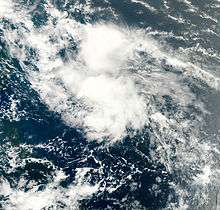
- August 2
- 1200 UTC (8:00 a.m. AST) – Tropical Depression Four develops from an area of low pressure in the central Atlantic.[9]
- August 3
- 0600 UTC (2:00 a.m. AST) – Tropical Depression Four intensifies into Tropical Storm Colin roughly 840 mi (1350 km) east of the Lesser Antilles.[9]
- 1800 UTC (2:00 p.m. AST) – Tropical Storm Colin degenerates into a trough of low pressure.[9]
- August 5
- 1200 UTC (8:00 a.m. AST) – The remnants of Tropical Storm Colin regenerate into a tropical storm roughly 280 mi (450 km) north-northeast of San Juan, Puerto Rico.[9]
- 2100 UTC (5:00 p.m. AST) – Tropical Storm Colin attains its peak intensity with maximum sustained winds of 60 mph (95 km/h) and a minimum barometric pressure of 1005 mb (hPa; 29.68 inHg).[9]
- August 8
- 0000 UTC (8:00 p.m. AST August 7) – Tropical Storm Colin weakens to a tropical depression roughly 170 mi (275 km) south-southwest of Bermuda.[9]
- 1200 UTC (8:00 a.m. AST) – Tropical Depression Colin dissipates roughly 100 mi (160 km) southwest of Bermuda.[9]
- August 10
- 1800 UTC (1:00 p.m. CDT) – Tropical Depression Five develops from an area of low pressure roughly 105 mi (165 km) west of Naples, Florida.[10]
- August 11
- 0000 UTC (7:00 p.m. CDT August 10) – Tropical Depression Five attains its peak intensity with maximum sustained winds of 35 mph (55 km/h) and a minimum barometric pressure of 1007 mb (hPa; 29.74 inHg).[10]
- 0600 UTC (2:00 a.m. CDT) – Tropical Depression Five degenerates into a remnant area of low pressure roughly 125 mi (200 km) west of Naples, Florida.[10]
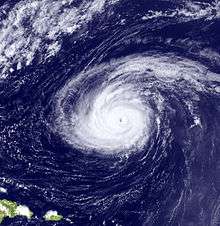
- August 21
- 1800 UTC (2:00 p.m. AST) – Tropical Depression Six develops from an area of low pressure roughly 450 mi (720 km) west-southwest of the Cape Verde Islands.[11]
- August 22
- 0600 UTC (2:00 a.m. AST) – Tropical Depression Six intensifies into Tropical Storm Danielle.[11]
- August 23
- 1800 UTC (2:00 p.m. AST) – Tropical Storm Danielle intensifies into a Category 1 hurricane roughly 960 mi (1545 km) west of the southernmost Cape Verde Islands.[11]
- August 25
- 0600 UTC (2:00 a.m. AST) – Tropical Depression Seven develops from an area of low pressure roughly 200 mi (320 km) west-southwest of the Cape Verde Islands.[12]
- 1200 UTC (8:00 a.m. AST) – Tropical Depression Seven intensifies into Tropical Storm Earl.[12]
- August 26
- 0600 UTC (2:00 a.m. AST) – Hurricane Danielle intensifies into a Category 2 hurricane.[11]
- August 27
- 0600 UTC (2:00 a.m. AST) – Hurricane Danielle intensifies into a Category 3 hurricane, the first major hurricane of the season.[11]
- 1800 UTC (2:00 p.m. AST) – Hurricane Danielle intensifies into a Category 4 hurricane and simultaneously attains its peak intensity with maximum sustained winds of 135 mph (215 km/h) and a minimum barometric pressure of 942 mb (hPa; 27.82 inHg).[11]
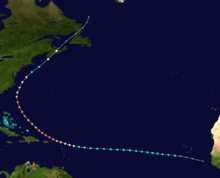
- August 28
- 0000 UTC (8:00 p.m. AST August 27) – Hurricane Danielle weakens to a Category 3 hurricane.[11]
- 0600 UTC (2:00 a.m. AST) – Hurricane Danielle weakens to a Category 2 hurricane.[11]
- August 29
- 0600 UTC (2:00 a.m. AST) – Hurricane Danielle weakens to a Category 1 hurricane.[11]
- 1200 UTC (8:00 a.m. AST) – Tropical Storm Earl intensifies into a Category 1 hurricane roughly 220 mi (355 km) east of the northern Leeward Islands.[12]
- August 30
- 0000 UTC (8:00 p.m. AST August 29) – Hurricane Earl intensifies into a Category 2 hurricane.[12]
- 1200 UTC (8:00 a.m. EDT) – Hurricane Earl intensifies into a Category 3 hurricane.[12]
- 1200 UTC (8:00 a.m. AST) – A tropical depression develops from an area of low pressure roughly 900 mi (1450 km) east of the Lesser Antilles.[13]
- 1800 UTC (2:00 p.m. AST) – Hurricane Danielle weakens to a tropical storm.[11]
- 1800 UTC (2:00 p.m. EDT) – Hurricane Earl intensifies into a Category 4 hurricane.[12]
- 1800 UTC (2:00 p.m. AST) – The tropical depression intensifies into Tropical Storm Fiona.[13]
- August 31
- 0000 UTC (8:00 p.m. AST August 30) – Tropical Storm Danielle degenerates into a remnant area of low pressure well northeast of the Azores.[11]
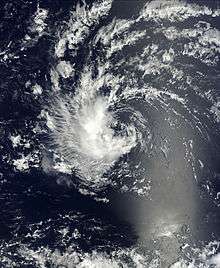
September
- September 1
- 0000 UTC (8:00 p.m. EDT August 31) – Hurricane Earl weakens to a Category 3 hurricane.[12]
- 0600 UTC (2:00 a.m. AST) – Tropical Depression Nine develops from an area of low pressure roughly 800 mi (1290 km) west-southwest of the Cape Verde Islands.[14]
- 1200 UTC (8:00 a.m. AST) – Tropical Storm Fiona attains its peak intensity with a minimum barometric pressure of 998 mb (hPa; 29.47 inHg).[13]
- 1200 UTC (8:00 a.m. AST) – Tropical Depression Nine intensifies into Tropical Storm Gaston.[14]
- 1800 UTC (2:00 p.m. EDT) – Hurricane Earl re-intensifies into a Category 4 hurricane.[12]
- 1800 UTC (2:00 p.m. AST) – Tropical Storm Fiona attains peak maximum sustained winds of 65 mph (100 km/h).[13]
- 1800 UTC (2:00 p.m. AST) – Tropical Storm Gaston attains its peak intensity with maximum sustained winds of 40 mph (65 km/h) and a minimum barometric pressure of 1005 mb (hPa; 29.68 inHg).[14]
- September 2
- 0600 UTC (2:00 a.m. EDT) – Hurricane Earl attains its peak intensity with maximum sustained winds of 145 mph (230 km/h) and a minimum barometric pressure of 927 mb (hPa; 27.37 inHg).[12]
- 1800 UTC (2:00 p.m. EDT) – Hurricane Earl weakens to a Category 3 hurricane.[12]
- 1800 UTC (2:00 p.m. AST) – Tropical Storm Gaston degenerates into a remnant area of low pressure roughly midway between Africa and the Lesser Antilles.[14]
- September 3
- 0000 UTC (8:00 p.m. EDT September 2) – Hurricane Earl weakens to a Category 2 hurricane.[12]
- 1200 UTC (8:00 a.m. EDT) – Hurricane Earl weakens to a Category 1 hurricane.[12]
- September 4
- 0000 UTC (8:00 p.m. EDT September 3) – Hurricane Earl weakens to a tropical storm roughly 130 mi (210 km) south-southeast of Long Island, New York.[12]
- 0000 UTC (8:00 p.m. AST September 3) – Tropical Storm Fiona degenerates into a remnant area of low pressure roughly 95 mi (150 km) northeast of Bermuda.[13]
- 1200 UTC (8:00 a.m. AST) – Tropical Storm Earl re-intensifies into a Category 1 hurricane.[12]
- 1500 UTC (11:00 a.m. AST) – Hurricane Earl makes its first landfall near Liverpool, Nova Scotia, with winds of 75 mph (120 km/h).
- 1900 UTC (3:00 p.m. AST) – Hurricane Earl makes its second and final landfall in Prince Edward Island, and simultaneously weakens to a tropical storm, with winds of 70 mph (110 km/h).[12]
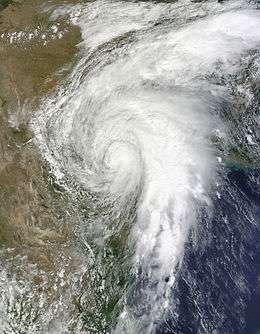
- September 5
- 0000 UTC (8:00 p.m. AST September 4) – Tropical Storm Earl transitions into an extratropical cyclone in the Gulf of St. Lawrence.[12]
- 1800 UTC (1:00 p.m. CDT) – Tropical Depression Ten develops from an area of low pressure in the southern Bay of Campeche.[15]
- September 6
- 0600 UTC (1:00 a.m. CDT) – Tropical Depression Ten intensifies into Tropical Storm Hermine.[15]
- September 7
- 0200 UTC (9:00 p.m. CDT September 6) – Tropical Storm Hermine attains its peak intensity with maximum sustained winds of 70 mph (110 km/h) and a minimum barometric pressure of 989 mb (hPa; 29.21 inHg) and simultaneously makes landfall near Matamoros, Mexico at that intensity.[15]
- September 8
- 0000 UTC (7:00 p.m. CDT September 7) – Tropical Storm Hermine weakens to a tropical depression over central Texas.[15]
- 0600 UTC (2:00 a.m. AST) – A tropical depression develops from an area of low pressure roughly 80 mi (130 km) southeast of the southernmost Cape Verde Islands.[16]
- 1200 UTC (8:00 a.m. AST) – The tropical depression intensifies into Tropical Storm Igor.[16]
- September 9
- 1200 UTC (8:00 a.m. AST) – Tropical Storm Igor weakens to a tropical depression.[16]
- 1800 UTC (1:00 p.m. CDT) – Tropical Depression Hermine transitions into a post-tropical cyclone over southeastern Kansas.[15]
- September 10
- 1200 UTC (8:00 a.m. AST) – Tropical Depression Igor re-intensifies into a tropical storm.
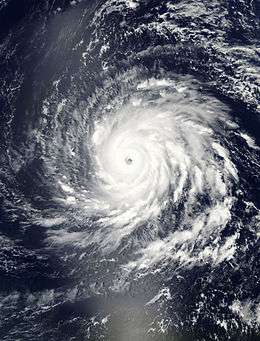
- September 12
- 0000 UTC (8:00 p.m. AST September 11) – Tropical Storm Igor intensifies into a Category 1 hurricane.[16]
- 0600 UTC (2:00 a.m. AST) – Tropical Depression Twelve develops from an area of low pressure roughly 250 mi (400 km) southeast of the southernmost Cape Verde Islands.[17]
- 1200 UTC (8:00 a.m. AST) – Hurricane Igor intensifies into a Category 2 hurricane.[16]
- 1800 UTC (2:00 p.m. AST) – Hurricane Igor intensifies into a Category 4 hurricane.[16]
- 1800 UTC (2:00 p.m. AST) – Tropical Depression Twelve intensifies into Tropical Storm Julia.[17]
- September 14
- 1200 UTC (8:00 a.m. AST) – Tropical Storm Julia intensifies into a Category 1 hurricane.[17]
- 1200 UTC (8:00 a.m. EDT) – A tropical depression develops from an area of low pressure roughly 325 mi (525 km) east of Chetumal, Mexico.[18]
- 1200 UTC (8:00 a.m. AST) – Tropical Storm Fiona attains its peak intensity with a minimum barometric pressure of 998 mb (hPa; 29.47 inHg).[13]
- 1800 UTC (2:00 p.m. EDT) – The tropical depression intensifies into Tropical Storm Karl.[18]
- September 15
- 0000 UTC (8:00 p.m. AST September 14) – Hurricane Igor attains its peak intensity with maximum sustained winds of 155 mph (250 km/h) and a minimum barometric pressure of 924 mb (hPa; 27.29 inHg).[16]
- 0000 UTC (8:00 p.m. AST September 14) – Hurricane Julia intensifies into a Category 2 hurricane.[17]
- 0600 UTC (2:00 a.m. AST) – Hurricane Julia intensifies into a Category 3 hurricane.[17]
- 1200 UTC (8:00 a.m. AST) – Hurricane Julia intensifies into a Category 4 hurricane and simultaneously attains its peak intensity with maximum sustained winds of 140 mph (220 km/h) and a minimum barometric pressure of 948 mb (hPa; 27.99 inHg).[17]
- 1245 UTC (7:45 a.m. CDT) – Tropical Storm Karl makes its first landfall near Rio Huach, Mexico, with winds of 65 mph (100 km/h).[18]
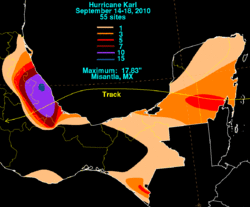
- September 16
- 0000 UTC (8:00 p.m. AST September 15) – Hurricane Julia weakens to a Category 3 hurricane.[17]
- 1200 UTC (8:00 a.m. AST) – Hurricane Julia weakens to a Category 2 hurricane.[17]
- 1800 UTC (2:00 p.m. AST) – Hurricane Julia weakens to a Category 1 hurricane.[17]
- 1800 UTC (1:00 p.m. CDT) – Tropical Storm Karl intensifies into a Category 1 hurricane.[18]
- September 17
- 0000 UTC (7:00 p.m. CDT September 16) – Hurricane Karl intensifies into a Category 2 hurricane.[18]
- 0600 UTC (2:00 a.m. AST) – Hurricane Igor weakens to a Category 3 hurricane.[16]
- 1200 UTC (7:00 a.m. CDT) – Hurricane Karl intensifies into a Category 3 hurricane and simultaneously attains its peak intensity with maximum sustained winds of 125 mph (205 km/h) and a minimum barometric pressure of 956 mb (hPa; 28.23 inHg).[18]
- 1645 UTC (11:45 a.m. CDT) – Hurricane Karl makes its second and final landfall roughly 10 mi (20 km) northwest of Veracruz, Mexico, with winds of 115 mph (185 km/h).[18]
- 1800 UTC (2:00 p.m. AST) – Hurricane Igor weakens to a Category 2 hurricane.[16]
- 1800 UTC (1:00 p.m. CDT) – Hurricane Karl weakens to a Category 2 hurricane.[18]
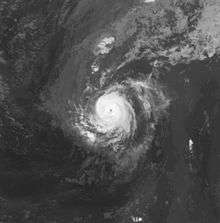
- September 18
- 0000 UTC (8:00 p.m. AST September 17) – Hurricane Julia weakens to a tropical storm.[17]
- 0000 UTC (7:00 p.m. CDT September 17) – Hurricane Karl weakens to a tropical storm.[18]
- 0600 UTC (1:00 a.m. CDT) – Tropical Storm Karl weakens to a tropical depression.[18]
- 1200 UTC (7:00 a.m. CDT) – Tropical Depression Karl dissipates roughly 75 mi (120 km) west-southwest of Veracruz.[18]
- 1800 UTC (2:00 p.m. AST) – Hurricane Igor weakens to a Category 1 hurricane.[16]
- September 20
- 1800 UTC (2:00 p.m. AST) – Tropical Storm Julia degenerates into a remnant area of low pressure roughly 950 mi (1530 km) west of the Azores.[17]
- 1800 UTC (2:00 p.m. AST) – Tropical Storm Fourteen develops from an area of low pressure roughly 400 mi (640 km) west of the Cape Verde Islands.[19]
- September 21
- 0000 UTC (8:00 p.m. AST September 20) – Tropical Depression Fourteen intensifies into Tropical Storm Lisa.[19]
- 1500 UTC (11:00 a.m. AST) – Hurricane Igor makes landfall near Cape Race, Newfoundland, with winds of 85 mph (140 km/h).[16]
- 1800 UTC (2:00 p.m. AST) – Hurricane Igor transitions into an extratropical cyclone off the northeastern coast of Newfoundland.[16]
- September 22
- 1800 UTC (2:00 p.m. AST) – Tropical Storm Lisa weakens to a tropical depression.[19]
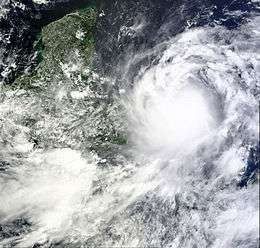
- September 23
- 1200 UTC (8:00 a.m. AST) – Tropical Depression Lisa re-intensifies into a tropical storm.[19]
- 1200 UTC (8:00 a.m. EDT) – Tropical Depression Fifteen develops from an area of low pressure roughly 490 mi (790 km) east of Cabo Gracias a Dios.[20]
- 1800 UTC (2:00 p.m. EDT) – Tropical Depression Fifteen intensifies into Tropical Storm Matthew roughly 410 mi (660 km) east of Cabo Gracias a Dios.[20]
- September 24
- 1800 UTC (1:00 p.m. CDT) – Tropical Storm Matthew attains its peak intensity with maximum sustained winds of 60 mph (95 km/h) and a minimum barometric pressure of 998 mb (hPa; 29.47 inHg).[20]
- 1900 UTC (2:00 p.m. CDT) – Tropical Storm Matthew makes its first landfall roughly 20 mi (30 km) south of Cabo Gracias a Dios with winds of 60 mph (95 km/h).[20]
- 2100 UTC (5:00 p.m. AST) – Tropical Storm Lisa intensifies into a Category 1 hurricane.[19]
- September 25
- 0000 UTC (8:00 p.m. AST September 24) – Hurricane Lisa attains its peak intensity with maximum sustained winds of 85 mph (140 km/h) and a minimum barometric pressure of 982 mb (hPa; 29.00 inHg).[19]
- 1200 UTC (8:00 a.m. AST) – Hurricane Lisa weakens to a tropical storm.[19]
- 1500 UTC (10:00 a.m. CDT) – Tropical Storm Matthew makes its second and final landfall roughly 10 mi (20 km) north-northeast of Monkey River Town, Belize, with winds of 40 mph (65 km/h).[20]
- 1800 UTC (1:00 p.m. CDT) – Tropical Storm Matthew weakens to a tropical depression.[20]
- September 26
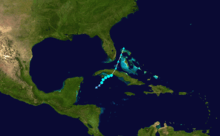
- 1200 UTC (8:00 a.m. AST) – Tropical Storm Lisa weakens to a tropical depression.[19]
- 1200 UTC (7:00 a.m. CDT) – Tropical Depression Matthew degenerates into a remnant area of low pressure.[20]
- 1800 UTC (2:00 p.m. AST) – Tropical Depression Lisa degenerates into a remnant area of low pressure.[19]
- September 28
- 1200 UTC (8:00 a.m. EDT) – Tropical Storm Nicole develops from an area of low pressure roughly 65 mi (100 km) south of the Isle of Youth.[21]
- September 29
- 1200 UTC (8:00 a.m. EDT) – Tropical Storm Nicole attains its peak intensity with maximum sustained winds of 45 mph (75 km/h) and a minimum barometric pressure of 995 mb (hPa; 29.38 inHg).[21]
- 1500 UTC (11:00 a.m. EDT) – Tropical Storm Nicole degenerates into a trough of low pressure over Cuba.[21]
October
- October 6
- 0600 UTC (2:00 a.m. AST) – Subtropical Depression Seventeen develops from an area of low pressure roughly 230 mi (370 km) north-northwest of San Juan, Puerto Rico.[22]
- 1200 UTC (8:00 a.m. AST) – Subtropical Depression Seventeen intensifies into Subtropical Storm Otto.[22]
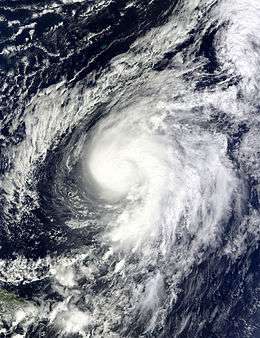
- October 7
- 1200 UTC (8:00 a.m. AST) Subtropical Storm Otto transitions into a tropical storm.[22]
- October 8
- 1200 UTC (8:00 a.m. AST) – Tropical Storm Otto intensifies into a Category 1 hurricane.[22]
- October 9
- 0000 UTC (8:00 p.m. AST October 8) – Hurricane Otto attains its peak intensity with maximum sustained winds of 85 mph (140 km/h) and a minimum barometric pressure of 976 mb (hPa; 28.82 inHg).[22]
- October 10
- 0000 UTC (8:00 p.m. AST October 9) – Hurricane Otto weakens to a tropical storm.[22]
- 0600 UTC (2:00 a.m. AST) – Tropical Storm Otto transitions into an extratropical cyclone roughly 900 mi (1450 km) east-northeast of Bermuda.[22]
- October 11
- 0000 UTC (8:00 p.m. EDT October 10) – A tropical depression develops from an area of low pressure roughly 100 mi (160 km) southeast of Cabo Gracias a Dios.[23]
- 0600 UTC (2:00 a.m. EDT) – The tropical depression intensifies into Tropical Storm Paula.[23]
- 1200 UTC (8:00 a.m. EDT) – Tropical Storm Paula makes its first landfall near Cabo Gracias a Dios with winds of 50 mph (85 km/h).[23]
- October 12
- 0000 UTC (8:00 p.m. EDT October 11) – Tropical Storm Paula intensifies into a Category 1 hurricane.[23]
- 1800 UTC (1:00 p.m. CDT) – Hurricane Paula intensifies into a Category 2 hurricane and simultaneously attains its peak intensity with maximum sustained winds of 105 mph (165 km/h) and a minimum barometric pressure of 981 mb (hPa; 28.97 inHg).[23]
- October 13
- 1800 UTC (1:00 p.m. CDT) – Hurricane Paula weakens to a Category 1 hurricane.[23]
- October 14
- 1200 UTC (8:00 a.m. EDT) – Hurricane Paula weakens to a tropical storm.[23]
- 1500 UTC (11:00 a.m. EDT) – Tropical Storm Paula makes its second and final landfall between St. Lucia, Cuba and Puerto Esperanza, Cuba, with winds of 65 mph (100 km/h).[23]
- October 15
- 0600 UTC (2:00 a.m. EDT) – Tropical Storm Paula weakens to a tropical depression.[23]
- 1200 UTC (8:00 a.m. EDT) – Tropical Depression Paula degenerates into a remnant area of low pressure.[23]

- October 20
- 0600 UTC (2:00 a.m. EDT) – Tropical Depression Nineteen develops from an area of low pressure roughly 170 mi (270 km) north of Cabo Gracias a Dios.[24]
- October 21
- 1200 UTC (8:00 a.m. EDT) – Tropical Depression Nineteen intensifies into Tropical Storm Richard roughly 180 mi (290 km) northeast of Cabo Gracias a Dios.[24]
- October 24
- 0600 UTC (1:00 a.m. CDT) – Tropical Storm Richard intensifies into a Category 1 hurricane.[24]
- October 25
- 0000 UTC (7:00 p.m. CDT October 24) – Hurricane Richard intensifies into a Category 2 hurricane and simultaneously attains its peak intensity with maximum sustained winds of 100 mph (160 km/h) and a barometric pressure of 977 mb (hPa; 28.85 inHg).[24]
- 0030 UTC (7:30 p.m. CDT October 24) – Hurricane Richard makes landfall near Gales Point, Belize, with maximum sustained winds of 100 mph (160 km/h).[24]
- 0600 UTC (1:00 a.m. CDT) – Hurricane Richard weakens to a Category 1 hurricane.[24]
- 1200 UTC (7:00 a.m. CDT) – Hurricane Richard weakens to a tropical storm.[24]
- 1800 UTC (1:00 p.m. CDT) – Tropical Storm Richard weakens to a tropical depression roughly 115 mi (175 km) south of Campeche.[24]
- October 26
- 0000 UTC (7:00 p.m. CDT October 25) – Tropical Depression Richard degenerates into a remnant area of low pressure roughly 20 mi (30 km) southeast of Ciudad del Carmen.[24]
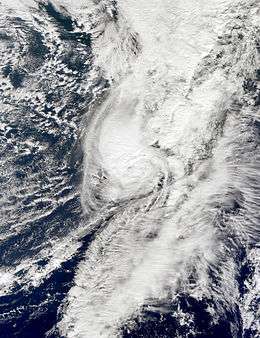
- October 28
- 1800 UTC (2:00 p.m. AST) – A tropical depression develops from an area of low pressure roughly 450 mi (720 km) south-southeast of Bermuda.[25]
- October 29
- 0000 UTC (8:00 p.m. AST October 28) – The tropical depression intensifies into Tropical Storm Shary.[25]
- 0600 UTC (2:00 a.m. AST) – A tropical depression develops from an area of low pressure roughly 400 mi (640 km) southeast of Barbados.[26]
- 1200 UTC (8:00 a.m. AST) – The tropical depression intensifies into Tropical Storm Tomas.[26]
- October 30
- 0000 UTC (8:00 p.m. AST October 29) – Tropical Storm Shary intensifies into a Category 1 hurricane.[25]
- 0600 UTC (2:00 a.m. AST) – Hurricane Shary attains its peak intensity with maximum sustained winds of 75 mph (120 km/h) and a minimum barometric pressure of 989 mb (hPa; 29.21 inHg).[25]
- 0900 UTC (5:00 a.m. AST) – Tropical Storm Tomas makes its first landfall on the south coast of Barbados with winds of 70 mph (110 km/h).[26]
- 1200 UTC (8:00 a.m. AST) – Tropical Storm Tomas intensifies into a Category 1 hurricane.[26]
- 1800 UTC (2:00 p.m. AST) – Hurricane Shary transitions into an extratropical cyclone several hundred miles south of Newfoundland.[25]
- 2000 UTC (4:00 p.m. AST) – Hurricane Tomas intensifies into a Category 2 hurricane and simultaneously makes its second landfall on the north coast of Saint Vincent with winds of 100 mph (160 km/h).[26]
- October 31
- 0000 UTC (8:00 p.m. AST October 30) – Hurricane Tomas attains its peak intensity with maximum sustained winds of 100 mph (160 km/h) and a minimum barometric pressure of 982 mb (hPa; 29.00 inHg).[26]
- 1200 UTC (8:00 a.m. AST) – Hurricane Tomas weakens to a Category 1 hurricane.[26]
November
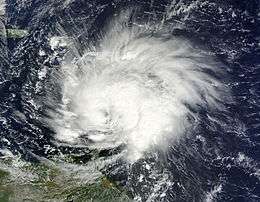
- November 1
- 0000 UTC (8:00 p.m. EDT October 31) – Hurricane Tomas weakens to a tropical storm.[26]
- November 3
- 0000 UTC (8:00 p.m. EDT November 2) – Tropical Storm Tomas weakens to a tropical depression.[26]
- 1800 UTC (2:00 p.m. EDT) – Tropical Depression Tomas re-intensifies into a tropical storm.[26]
- November 5
- 0600 UTC (2:00 a.m. EDT) – Tropical Storm Tomas re-intensifies into a Category 1 hurricane.[26]
- November 6
- 0000 UTC (8:00 p.m. EDT November 5) – Hurricane Tomas weakens to a tropical storm.[26]
- 1800 UTC (2:00 p.m. AST) – Tropical Storm Tomas re-intensifies into a Category 1 hurricane.[26]
- November 7
- 1200 UTC (8:00 a.m. AST) – Hurricane Tomas weakens to a tropical storm.[26]
- November 8
- 0000 UTC (8:00 p.m. AST November 7) – Tropical Storm Tomas transitions into an extratropical cyclone south of Newfoundland.[26]
- November 30
- The 2010 Atlantic hurricane season officially ends.[3]
See also
Notes
- ↑ An average season, as defined by the National Oceanic and Atmospheric Administration, has twelve tropical storms, six hurricanes and two major hurricanes.[2]
- ↑ A major hurricane is a storm that ranks as Category 3 or higher on the Saffir–Simpson hurricane scale.[4]
- ↑ The figures for maximum sustained winds and position estimates are rounded to the nearest 5 units (knots, miles, or kilometers), following the convention used in the National Hurricane Center's operational products for each storm.[5] All other units are rounded to the nearest digit.
References
- ↑ "Extremely Active Atlantic Hurricane Season was a 'Gentle Giant' for U.S.". National Oceanic and Atmospheric Administration. National Oceanic and Atmospheric Administration. November 29, 2010. Retrieved January 21, 2013.
- ↑ Climate Prediction Center Internet Team (August 4, 2011). "Background Information: The North Atlantic Hurricane Season". National Oceanic and Atmospheric Administration. Climate Prediction Center. Retrieved January 5, 2013.
- 1 2 3 Chris Landsea; Neal Dorst (ed.) (June 2, 2011). "G: Tropical Cyclone Climatology". Hurricane Research Division: Frequently Asked Questions. Atlantic Oceanographic and Meteorological Laboratory. National Oceanic and Atmospheric Administration. G1) When is hurricane season ?. Retrieved January 5, 2013.
- ↑ Chris Landsea; Neal Dorst (ed.) (June 2, 2011). "A: Basic Definitions". Hurricane Research Division: Frequently Asked Questions. Atlantic Oceanic and Meteorology Laboratory. National Oceanic and Atmospheric Administration. A3) What is a super-typhoon? What is a major hurricane ? What is an intense hurricane ?. Retrieved January 5, 2013.
- ↑ 2010 Tropical Cyclone Advisory Archive. National Hurricane Center (Archive). National Oceanic and Atmospheric Administration. February 7, 2009. Retrieved January 5, 2013.
- 1 2 3 4 5 6 7 8 9 10 Richard J. Pasch (December 15, 2010). Hurricane Alex Tropical Cyclone Report (PDF). National Hurricane Center (Report). National Oceanic and Atmospheric Administration. pp. 1, 2, 5. Retrieved January 5, 2013.
- 1 2 3 John L. Beven II (October 21, 2010). Tropical Depression Two Tropical Cyclone Report (PDF). National Hurricane Center (Report). National Oceanic and Atmospheric Administration. pp. 1, 2. Retrieved January 6, 2013.
- 1 2 3 4 5 6 7 Stacy R. Stewart (December 28, 2010). Tropical Storm Bonnie Tropical Cyclone Report (PDF). National Hurricane Center (Report). National Oceanic and Atmospheric Administration. pp. 1, 2, 5. Retrieved January 6, 2013.
- 1 2 3 4 5 6 7 Daniel P. Brown (October 4, 2010). Tropical Storm Colin Tropical Cyclone Report (PDF). National Hurricane Center (Report). National Oceanic and Atmospheric Administration. pp. 1, 2, 4. Retrieved January 20, 2013.
- 1 2 3 Michael J. Brennan (November 4, 2010). Tropical Depression Five Tropical Cyclone Report (PDF). National Hurricane Center (Report). National Oceanic and Atmospheric Administration. pp. 1, 3. Retrieved January 20, 2013.
- 1 2 3 4 5 6 7 8 9 10 11 Todd B. Kimberlain (December 15, 2010). Hurricane Danielle Tropical Cyclone Report (PDF). National Hurricane Center (Report). National Oceanic and Atmospheric Administration. pp. 1, 2, 5, 6. Retrieved January 20, 2013.
- 1 2 3 4 5 6 7 8 9 10 11 12 13 14 15 16 John P. Cangialosi (January 13, 2011). Hurricane Earl Tropical Cyclone Report (PDF). National Hurricane Center (Report). National Oceanic and Atmospheric Administration. pp. 1, 2, 6, 7. Retrieved January 20, 2013.
- 1 2 3 4 5 6 Robbie Berg (October 18, 2010). Tropical Storm Fiona Tropical Cyclone Report (PDF). National Hurricane Center (Report). National Oceanic and Atmospheric Administration. pp. 1, 2, 4. Retrieved January 20, 2013.
- 1 2 3 4 Eric S. Blake (November 18, 2010). Tropical Storm Gaston Tropical Cyclone Report (PDF). National Hurricane Center (Report). National Oceanic and Atmospheric Administration. pp. 1, 3. Retrieved January 20, 2013.
- 1 2 3 4 5 Lixion A. Avila (November 22, 2010). Tropical Storm Hermine Tropical Cyclone Report (PDF). National Hurricane Center (Report). National Oceanic and Atmospheric Administration. pp. 1, 4. Retrieved January 20, 2013.
- 1 2 3 4 5 6 7 8 9 10 11 12 Richard J. Pasch; Todd B. Kimberlain (February 15, 2011). Hurricane Igor Tropical Cyclone Report (PDF). National Hurricane Center (Report). National Oceanic and Atmospheric Administration. pp. 1, 2, 6, 7. Retrieved January 20, 2013.
- 1 2 3 4 5 6 7 8 9 10 11 John L. Beven II; Christopher W. Landsea (December 9, 2010). Hurricane Julia Tropical Cyclone Report (PDF). National Hurricane Center (Report). National Oceanic and Atmospheric Administration. pp. 1, 2, 5, 6. Retrieved January 20, 2013.
- 1 2 3 4 5 6 7 8 9 10 11 Stacy R. Stewart (January 31, 2011). Hurricane Karl Tropical Cyclone Report (PDF). National Hurricane Center (Report). National Oceanic and Atmospheric Administration. pp. 1, 2, 6. Retrieved January 20, 2013.
- 1 2 3 4 5 6 7 8 9 Daniel P. Brown (November 15, 2010). Hurricane Lisa Tropical Cyclone Report (PDF). National Hurricane Center (Report). National Oceanic and Atmospheric Administration. pp. 1, 4. Retrieved January 20, 2013.
- 1 2 3 4 5 6 7 Michael J. Brennan (December 30, 2010). Tropical Storm Matthew Tropical Cyclone Report (PDF). National Hurricane Center (Report). National Oceanic and Atmospheric Administration. pp. 1, 2, 5. Retrieved January 20, 2013.
- 1 2 3 Eric S. Blake (January 31, 2011). Tropical Storm Nicole Tropical Cyclone Report (PDF). National Hurricane Center (Report). National Oceanic and Atmospheric Administration. pp. 1, 4. Retrieved January 20, 2013.
- 1 2 3 4 5 6 7 John P. Cangialosi (November 17, 2010). Hurricane Otto Tropical Cyclone Report (PDF). National Hurricane Center (Report). National Oceanic and Atmospheric Administration. pp. 1, 2, 4. Retrieved January 13, 2013.
- 1 2 3 4 5 6 7 8 9 10 Robbie Berg (December 20, 2010). Hurricane Paula Tropical Cyclone Report (PDF). National Hurricane Center (Report). National Oceanic and Atmospheric Administration. pp. 1, 2, 5. Retrieved January 13, 2013.
- 1 2 3 4 5 6 7 8 9 Todd B. Kimberlain (December 20, 2010). Hurricane Richard Tropical Cyclone Report (PDF). National Hurricane Center (Report). National Oceanic and Atmospheric Administration. pp. 1, 2, 5. Retrieved January 13, 2013.
- 1 2 3 4 5 Lixion A. Avila (January 3, 2011). Hurricane Shary Tropical Cyclone Report (PDF). National Hurricane Center (Report). National Oceanic and Atmospheric Administration. pp. 1, 4. Retrieved January 13, 2013.
- 1 2 3 4 5 6 7 8 9 10 11 12 13 14 15 Richard J. Pasch; Todd B. Kimberlain (March 7, 2011). Hurricane Tomas Tropical Cyclone Report (PDF). National Hurricane Center (Report). National Oceanic and Atmospheric Administration. pp. 1, 2, 5, 6. Retrieved January 13, 2013.
External links
| Wikimedia Commons has media related to 2010 Atlantic hurricane season. |
| Preceded by 2009 |
Atlantic hurricane season timelines 2010 |
Succeeded by 2011 |